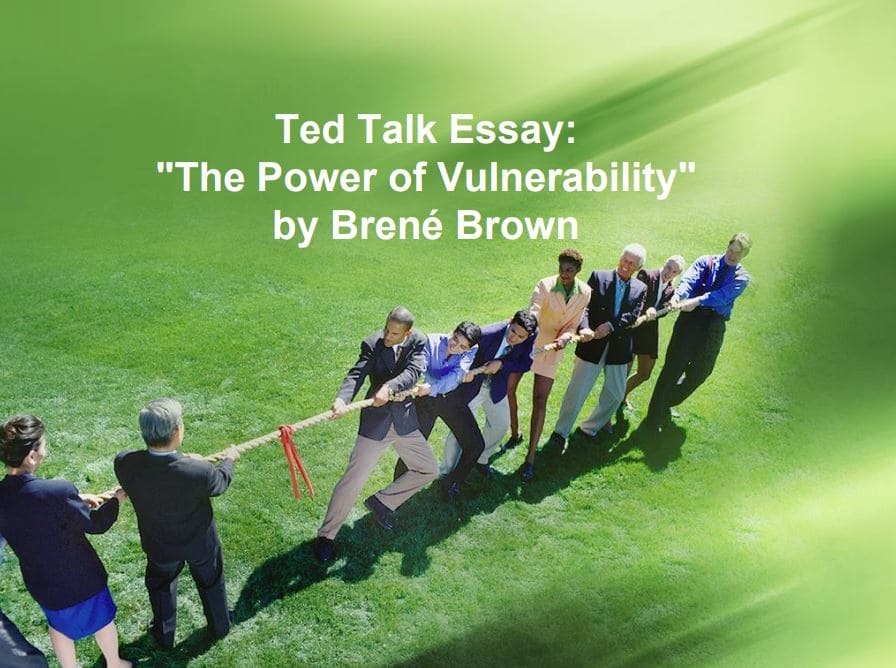In this Ted Talk essay on “The Power of Vulnerability” by Brené Brown, the author argues that all human beings have vulnerabilities. The social pressure to present a flawless identity encourages individuals to employ various coping mechanisms to compensate for their weaknesses. In this case, Brown employs a presentation approach that personalizes the audience’s interpretation of the need to change the negative narrative associated with vulnerability because accepting one’s limitations could be a source of motivation for self-improvement and undo the tendency to focus on one’s strengths.
The Main Theme of the Video
The main point of Brown’s TED Talk is to dispel the widely accepted notion that vulnerability is a negative attribute. Brown redefines the typical perception of vulnerability by presenting it as an attribute that needs to be accepted and embraced rather than be a cause for denial and self-hate. People have different reasons for hiding their vulnerabilities, each of which ties to a unique and personal experience that takes place early on in their lives (Firestone par. 3). These experiences leave lasting limitations on people’s personalities. It also guides them toward their view of themselves and the world in general. When individuals accept their vulnerabilities, they can begin the process of self-improvement.

Life Experience
Brown’s TED Talk relates to my life experiences because its content explains my tendency to focus on my strengths and hide my weaknesses. People want to feel worthy and loved, while the power of vulnerability generally presents a sense of fear and shame for most people (Abbott 47). In a bid for self-preservation, I tend to identify more with situations that bring out the best of me rather than those that shed light on vulnerabilities. Consequently, I fail to take the necessary actions to change my weaknesses into strengths.
Importance
Changing one’s perception of vulnerability is essential because vulnerability is a source of motivation for self-improvement. According to Mundluru, accepting vulnerability is necessary for one’s true identity to emerge (1). Consequently, this aspect helps individuals to own their mistakes, venture toward risky areas with courage, and fully trust in their abilities. Equally important, individuals become more cautious of their words and actions instead of pretending that their actions do not affect other people (Brown 18:20-18:40). People are compassionate with one another when they accept their vulnerability. Moreover, it imparts a feeling of understanding for others in a similar position. Accepting one’s vulnerabilities plays an essential role in the process of self-improvement.
Application
Brown’s primary message can be applied in real life, where the individual continually struggles with forming social connections. Humans are social beings, and, while striving to form social connections, they often lock out their vulnerability, which is a critical trait for creating these connections (Firestone par. 2). People should be able to let others see them for who they are. They need to understand the different scopes of their identities that make them unique. People should not consider vulnerability a hindrance to their growth. However, they should use it to make deep and meaningful connections.
Surprising Fact
The one thing that surprised me was Brown’s ability to communicate about a personal, mental, and emotional issue in a way that resonates clearly and effortlessly with crowds across different walks of life. People should be willing to receive and give feedback in honest exchanges without being unduly defensive (Firestone par. 8). Brown’s approach to the topic allows the audience to draw parallels between Brown’s argument and personal experiences. Moreover, Brown’s views are framed to persuade the audience and take action.
Summing Up
In conclusion, the paradox presented by the discourse is that understanding and accepting people’s weaknesses is as essential as utilizing their strengths. People should not be ashamed of their shortcomings but rather draw strength from them. Individuals should love their imperfect selves and work toward utilizing their vulnerabilities to better their life situations.
Works Cited
Abbott, Dean. Common Good: Reflections on Everyday Vices and Virtues. Wipf and Stock, 2021.
Brown, Brené. “The Power of Vulnerability.” TED, Dec. 2010, www.ted.com/talks/brene_brown_the_power_of_vulnerability.
Firestone, Lisa. “How Embracing Vulnerability Strengthens Our Relationships.” Psychalive, 2017, www.psychalive.org/embracing-vulnerability-strengthens-connections/.
Mundluru, Shankar. “Strength and Vulnerability.” The Permanente Journal, vol. 23, 2019, p. 1, doi:10.7812/TPP/19.055.


